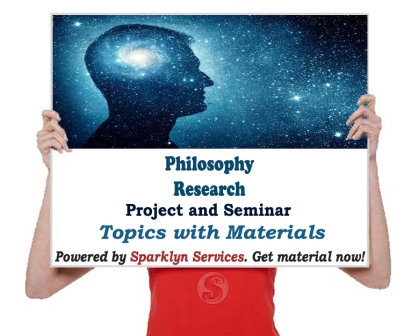General Introduction
1.1 Introduction
Aristotle in the commencement of his “Metaphysics” wrote: “pantes anthropoi tou eidenai oregontai phuse”[1] (all men by nature desire to know). This existential passion or desire is quite innate and intrinsic in man. Due to that irresistible urge in man to know, he involves himself in a curious and inquisitive search into the reasons for his existence. Perhaps Socrates realized this fact and so maintained, “an unexamined life is not worth living”[2].
In other words, the life of man on earth must have a purpose. And, in order to grasp this end of human life on earth, an intensive study is necessarily indispensable.
To provide an answer or answers to these timely interrogatives, scholars, thinkers, erudite philosophers from many schools of thought have given diverse views and opinions. St Augustine of Hippo argues and advocates that “Happiness” is the purpose of human life and actions. Put differently, he submits that happiness is the essence of human existence. Following this Augustinian trend of thesis would be that man; by virtue of his personhood has a natural inclination to happiness.
Nevertheless, the postulation of the end of human life as a search for happiness has altogether become problematic. The issue to grapple with is how to effect a true understanding of the notion of happiness. What do we mean when we say that someone is happy? In this wise, I intend to contribute to the effort being made towards understanding the one human objective − “to achieve happiness.” This will be done by a critical appraisal of the notion of happiness in St. Augustine.
1.2 The Statement Of The Problem
There are myriads of instabilities − political, economic, religious et cetera. The issues of bribery and corruption and the attendant poverty of purse and mind have remained heart-rending. In the most parts of the world, some countries are characterised as rich but poor nation, no thanks to her administrators, from past to the present.
Although many interpretations have been given to account for the numerous failures evident in the seemingly non-abating societal problems, I wish to focus on the psycho-existential quest of man as the root of the problem. What this means is that he understands the problem as emanating from the deep human desire to be satisfied and to feel good. Everybody desires the good And even when at the end what was desired turned out to be bad, it was initially desired as an apparent good.
Accordingly, the failed administrators are all seeking the ways to be happy. The youths who engage in violent, immoral and criminal activities are invariably seeking for happiness. If all these are so, it then calls for a fresh study of the notion of happiness. This is our contention! This is our aim!! However we do so through the perspective pf St. Augustine of Hippo.
1.3 Purpose Of The Study
What is happiness? What does it mean to be happy? And in what does happiness consist? These and other like questions are what I set out to investigate in this work. This investigation is proper especially at this moment when there is an obvious misinformation about the concept of happiness. People no longer understand what it means to be happy and the difference between happiness and pleasure. The fact we shall gather through this discursive investigation and exegesis, hopefully, will help to redirect our minds towards the proper appreciation of happiness.
1.4 Scope Of The Study
The centrality of the concept of happiness to man has made it a topic of everybody’s interest. Scholars of various inclinations have commented and written profusely about happiness. Various religions preach it as the goal of human striving encapsulated in the notion of the beatific vision. More so, the goal of scientific and technological advancements has also been noted to be the longing for happiness and good life
But not withstanding the available literary corpus on happiness, I will limit myself to the Augustinean view on happiness, especially as explicated in his works − The City of God and the Confessions. In any case, the views of other thinkers, philosophers and theologians will be made use of when the need arises.
1.5 Methodology
Every literary work goes with its unique style and methodology. In this work, I will employ the methods of exposition, analysis and evaluation. The views of Augustine on happiness are brought to the fore through a systematic narrative exposition to highlight the basic tenets. Now abreast with his doctrine, I shall analytically evaluate the whole idea with the strength of some existential facts. The whole methodological approach will be critical.
1.6 Division Of Work
The work is divided into five chapters. Chapter one is the general introduction for Proper understanding of the essay: the statement of the problem, the purpose and the method used, the scope, division of the work. Chapter two bears literature review on happiness. Chapter three provides us with the clarification of various concepts. The view of Augustine of Hippo is portrayed in chapter four. A critical appraisal and conclusion brings the work to an end in chapter five.




